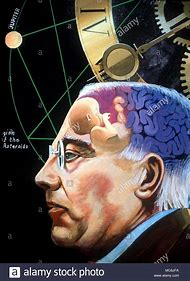The Fourth Way - Wrong Functions - P.D Ouspensky









The Fourth Way - Wrong Functions - P.D Ouspensky
Well, tell me what interests you most in all this and what you want to hear more about.Well, tell me what interests you most in all this and what you want to hear more about.
Q. I was interested in the question of imagination. I suppose it means that in the ordinary application of the word one was using the wrong meanings?
A. In the ordinary meaning of imagination the most important factor is missed, but in the terminology of this system we begin with what is most important. The most important factor in every function is: ' Is it under our control or not?' So when imagination is under our control we do not even call it imagination; we call it by various names visualization, creative thinking, inventive thinking-you can find a name for each special case. But when it comes by itself and controls us so that we are in its power, then we call it imagination.
Again, there is another side of imagination which we miss in ordinary understanding. This is that we imagine non-existing things- non existent capacities, for instance. we ascribe to ourselves powers which we do not have; we imagine ourselves to be self-conscious although we are not.
We have imaginary powers and imaginary self-consciousness and we imagine ourselves to be one, when really we are many different 'I's. There are many such things that we imagine about ourselves and other people. For instance, we imagine that we can 'do' , that we have choice; we have no choice, we cannot 'do' things just happen to us. So we imagine ourselves, really. We are not what we imagine ourselves to be.
Q.Is there any difference between imagination and day dreaming?
A. If you cannot control day-dreaming, it means that it is part of imagination; but not all of it. Imagination has many different sides. We imagine non-existent possibilities, non-existent powers.Q. Could you give me a definition of negative imagination? Imagining all kinds of unpleasant things, torturing oneself, imagining, all the things that might happen to you or other people-things like that: it takes differnt forms. Some people imagine different illnesses, some imagine accidents, others imagine misfortunes.
Q. Is the control of your emotions a reasonable objective?
A. Conrol of emotions is a very difficult thing. It is a very important part of self-study, but we cannot begin with the control of emotions, becuse we do not understand enough about emotions. I will explain: what we can do from the very beginning of observing the emotional function is to try to stop one particular manifestation in ourselves.
We must try the manifestation of unpleasant emotions. For many people this is one of the most difficult things, because unpleasant emotions are expressed so quickly and so easily that you cannot catch them. Yet unless you try you cannot really observe yourself, so from the very beginning, when observing emotions, you must try to stop the expression of unpleasant emotions.
This is the very first step. In this system we call all these unpleasant, violent or depressing emotions by the name of negative emotions.As I said, the first step is trying not to express these negative emotions; the second step is a study of negative emotions themselves, making lists of them, finding their connections-because some of them are simple and some of them are compound-and trying to understand that all negative emotions are absolutely useless; they do not serve any useful purpose; they do not make us aquainted with new things or bring use nearer to new things; they do not give us energy and create unpleasant illusions; they can even destroy physical health.
Thirdly, after a certain amunt of study and observation we may come to the conclusion that we can get rid of negative emotions, that are not obligatory. Here the system helps because it shows that in fact there is no real centre for negative emotions, bu that they belong to an artifical centre in us, which we create in childhood by imitating people with negative emotions by whom we are surrounded. People even teach people to express negative emotions.
The children learn still more by imitations; they imitate older children, older children imitate grown-up people, and so at a very early age they become professors of negative emotions.It is a great liberation when we begin to understand that there are no obligatory negative emotions. We are born without them, but for some unknown reason we teach ourselves negative emotions.
Q. To be free from negative emotions, must we be able to stop them arising?
A. This is wrong, because we cannot control emotions. I mentioned the different speed of different emotions. the slowest is the intellectual function. Next come moving and instinctive functions which ahve an approximately equal speed which is enormously quicker than intellectual.
The emotional function should be still quicker, but generally works at about the same speed as the instinctive function. So moving, instinctive and emotional functions are very much quicker than thought, and it is impossible to catch emotions by thought.
When we are in an emotional state they succeed each other so quickly that we have no time to think.But we can get an idea of the difference in speed by comparing thinking functions with moving functions. If, doing some quick movement, you try to observe yourself, you will see that you cannot. Thought cannot follow movement. Either you have to make the movement quite slow or you cannot observe. This is a definite fact.
Reference:The Fourth Way: P.D.Ouspensky
Articles-Popular
- Main
- Contact Us
- Planetary Existences-2
- Planetary Existences
- TWO REVELATIONS-2
- Jeffery Epstein - The Saga - 9
- Jeffery Epstein - The Saga - 8
- Jeffery Epstein - The Saga - 10
- The Two Revelations
- The Fourth Way - Study of Oneself - P.D.Ouspensky
- Impeachment Investigators Subpoena White House - Ukraine
- Universality of Initiation
- Initiation and the Devas
- The Path Of Initiation
- The Participants In The Mysteries-2
- The Fourth Way - Wrong Functions - P.D Ouspensky
- The Final Initiation
- Statues are a mark of honour. Like Edward Colston, Cecil Rhodes and Oliver Cromwell have to go
- Discipleship - Group Relations - 2
- The Probationary Path - 2
- The Participants In The Mysteries
- Discipleship - Group Relationships
- Discipleship
- The Succeeding Two Initiations
- Jeffery Epstein - The Saga - 7
- Jeffery Epstein - The Saga - 6
Articles - Latest
- They Lied to Us! The Truth They Hid About Hitler’s Death — Gerard Williams
- Ramaposa Dragged Out of Parliament
- Madagascar Goverment Collapse
- The Reality of Digital Id
- Welcome To The End Of Western Dominance
- Why is the Sahel turning its back on France?
- Sarkozy gets 5 years in prison in Gadhafi case
- The EU in 2025: A union at the crossroads of chaos
- Deep distrust of EU leaves Italy's Meloni in a corner over bailout fund
- Regime crisis in France: Bayrou falls, now Macron must go!
- Idi Amin president of Uganda
- Anger at Starmer's 'surrender deal' that hands Spain control over Gibraltar border
- Iran doubles down as US signals Israel could strike during nuclear talks
- What could have caused Air India plane to crash in 30 seconds?
- WW3 fears explode as Britain now Russia's 'enemy number 1' - even ahead of Ukraine





